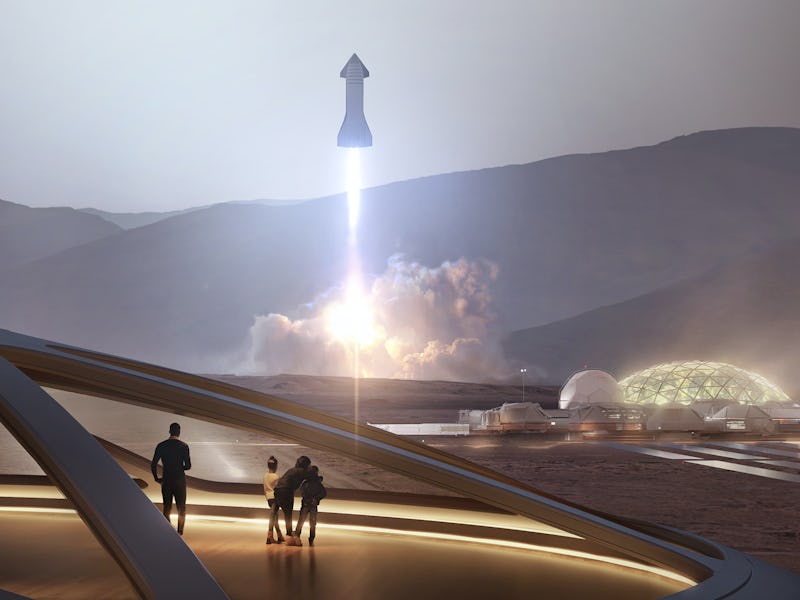SpaceX Starship: Elon Musk says it could protect 'light of consciousness’
The human-carrying spaceship could play a key role in preserving humanity in the universe.

The Starship, SpaceX's most ambitious rocket to date, could enable humanity to preserve itself and avoid permanent destruction. That's according to Elon Musk, CEO of the space-faring firm.
Musk declared via Twitter Monday evening that his company's project is "the key to making life multiplanetary & protecting the light of consciousness." Although he didn't elaborate, Musk has spoken before about how the Starship could enable humans to establish bases on Mars, reach out further into the solar system, and establish a planet-hopping network of bases.
It's a bold claim, but one that has helped shape SpaceX's broader trajectory as it works toward solving more near-term problems. The Starship, under development at the Boca Chica facility in Texas, is a ship that's designed to both meet the needs for this broader vision of the future, while also replacing existing vehicles like the Falcon 9 and Falcon Heavy rockets. The ship is fully reusable, stands nearly 400 feet tall (the exact measurement has varied during development), and is capable of transporting over 150 tons or 100 people into space at once.
This capability acts as the next logical step in SpaceX's history. Musk's claim came in response to a Twitter post that highlighted SpaceX's impressive progress in just 10 years. In 2010 it debuted the Falcon 9 rocket, and by 2015 it had successfully landed the Falcon 9 booster back on Earth after launch. By 2017 it was re-using old boosters, and then in 2020 the Crew Dragon successfully launched humans to the International Space Station.
How Starship will preserve consciousness – Beyond taking over from Falcon launches – think satellites and space station cargo – the Starship is designed to transport humans even further into the solar system. Its Raptor engines use a mix of liquid methane and oxygen, unlike the rocket propellant used in Falcon rockets. That means humans could land on a planet like Mars, harvest its natural resources, and venture out further by refueling along the way.
Why it's necessary – Musk has previously claimed that humanity needs to expand out as soon as possible, because the current window of opportunity might not last too long.
During a September 2019 presentation for the first full-size Starship in Boca Chica, Musk explained that the Earth has existed for around 4.5 billion years. Humans have only existed on Earth for a fraction of that time, and the species may only have a few hundred million years of existence left.
"It appears that consciousness is a very rare and precious thing and we should take whatever steps we can to preserve the light of consciousness. Only now, after 4.5 billion years has that window been open. That’s a long time to wait and it might not stay open for long. I’m pretty optimistic by nature, but there’s some chance that window will not be open for long, and I think we should become a multi-planet civilization while that window is open.”
Another reason for preservation is the possibility that humanity is alone in the universe. In July 2018, Musk shared a study from the University of Oxford’s Future of Humanity Institute. It looked at the Fermi paradox, which notes that there is a high chance of more intelligent life in the universe beyond just us, but there's also no evidence of its existence. Looking at the Drake equation, which tries to understand how many civilizations humanity could potentially contact, the team concluded that there is a 30 percent chance that humanity is alone.
"This is why we must preserve the light of consciousness by becoming a spacefaring civilization & extending life to other planets," Musk wrote at the time.
The Inverse analysis – Musk's far-flung visions for the future of humanity may seem only tangentially relevant to SpaceX's daily work, but they have helped to shape the firm's narrative and explain its future direction. Launching Crew Dragon has given the firm experience with launching humans, and developing Starship is set to lead to a versatile yet cost-efficient vehicle.
The next step in this plan could be the establishment of a permanent base on Mars, which would enable more scientific experiments. As Musk works toward a long-term vision for preserving humanity, the short-term advancements could offer big benefits.